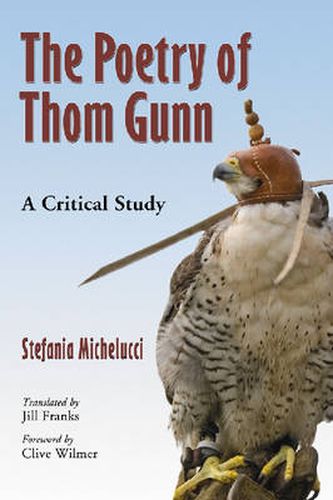Readings Newsletter
Become a Readings Member to make your shopping experience even easier.
Sign in or sign up for free!
You’re not far away from qualifying for FREE standard shipping within Australia
You’ve qualified for FREE standard shipping within Australia
The cart is loading…






This title is printed to order. This book may have been self-published. If so, we cannot guarantee the quality of the content. In the main most books will have gone through the editing process however some may not. We therefore suggest that you be aware of this before ordering this book. If in doubt check either the author or publisher’s details as we are unable to accept any returns unless they are faulty. Please contact us if you have any questions.
Throughout most of his work, Anglo-American poet Thom Gunn served as a mouthpiece for his time, illustrating the social, cultural, and historical transformations that have characterized western civilization from World War II until today. Striking images of the Holocaust and the tragedies of World War II emerge in some of Gunn’s poems about soldiers ( Innocence,
Claus Von Stauffenberg,
Misanthropos,
etc.) Likewise, metaphors for the social and cultural revolutions of the 1960s can be found in
Moly
and
Jack’s Straw Castle.
Characterized by rigorous intellectual honesty and sincerity, Gunn’s poetry constitutes a unique artistic experience in that it seeks to mediate between several opposite poles: old Europe against contemporary America; traditional metre against free verse; and the language of the present against the lessons of the great writers of the past.Starting with theoretical premises drawn from philosophy, anthropology, and sociology, this work examines Thom Gunn’s entire poetic career. In Gunn’s early poetry, the author argues, the predominant theme is the desire for freedom from the painful prison of the intellect and from the masks that the individual feels compelled to wear even in his sexual relationships. In Gunn’s later poetry, the author notes a gradual opening to human relationships and to Nature, which is also Gunn’s vindication and reevaluation of his own nature and the liberation of his long repressed and hidden homosexuality.
$9.00 standard shipping within Australia
FREE standard shipping within Australia for orders over $100.00
Express & International shipping calculated at checkout
This title is printed to order. This book may have been self-published. If so, we cannot guarantee the quality of the content. In the main most books will have gone through the editing process however some may not. We therefore suggest that you be aware of this before ordering this book. If in doubt check either the author or publisher’s details as we are unable to accept any returns unless they are faulty. Please contact us if you have any questions.
Throughout most of his work, Anglo-American poet Thom Gunn served as a mouthpiece for his time, illustrating the social, cultural, and historical transformations that have characterized western civilization from World War II until today. Striking images of the Holocaust and the tragedies of World War II emerge in some of Gunn’s poems about soldiers ( Innocence,
Claus Von Stauffenberg,
Misanthropos,
etc.) Likewise, metaphors for the social and cultural revolutions of the 1960s can be found in
Moly
and
Jack’s Straw Castle.
Characterized by rigorous intellectual honesty and sincerity, Gunn’s poetry constitutes a unique artistic experience in that it seeks to mediate between several opposite poles: old Europe against contemporary America; traditional metre against free verse; and the language of the present against the lessons of the great writers of the past.Starting with theoretical premises drawn from philosophy, anthropology, and sociology, this work examines Thom Gunn’s entire poetic career. In Gunn’s early poetry, the author argues, the predominant theme is the desire for freedom from the painful prison of the intellect and from the masks that the individual feels compelled to wear even in his sexual relationships. In Gunn’s later poetry, the author notes a gradual opening to human relationships and to Nature, which is also Gunn’s vindication and reevaluation of his own nature and the liberation of his long repressed and hidden homosexuality.